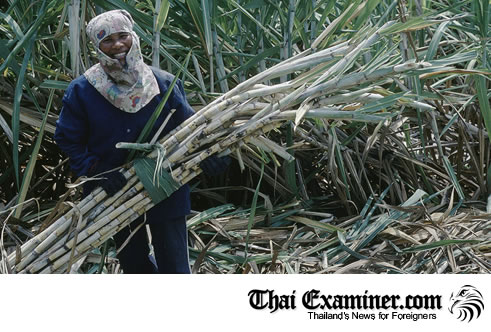New Thai government ethanol initiative highlights a leading Thai company and an emerging industry for Thailand
Worldwide sugar production surplus and the rise of biofuel have prompted the Thai government to export sugar less and produce more ethanol instead this year. The move may also be sign of things to come.

What comes to your mind when you think of Thailand’s leading agricultural exports? Rice? There is absolutely no doubt about that. Durian? Yes, Thailand is the world’s number one export exporter of the pungent fruit that most westerners loath. Rubber? of course, number one too. Sugar? well, for now Thailand is the second biggest sugar exporter in the world but that might soon be changing as the Thai government has decided to decrease raw sugar exports by 500,000 tons this year and perhaps more in the future.
The reason for the decision is the substantial drop in sugar price which is attributed to global enormous sugar output as all the world’s major producers such as China and Pakistan have bumper harvest.
Spiral in sugar prices and surge in demand for biofuel prompts Thailand to act
By some estimates, this year’s sugar crop may produce as many as 185 million tons of sugar, the largest number ever recorded, driving the prices down by almost 20 %. After experiencing the 2016-2017 drought, Thailand is expected to produce a record 14.3 million tons this year. Four-fifths of Thailand’s output is reserved by authorities for purposes other than domestic consumption. The downward spiral in global prices for sugar is making the prospects for Thailand’s sugar exports look less and less attractive. Instead, the 500,000 tons of sugar previously destined for world markets will be sold to local ethanol producers as there is an increasing market demand for biofuels in Thailand.
Change of strategy highlights Thai industry success
The move will have implications for the Thai sugar and bioenergy industries. It will be particularly significant for the Thai company the Mitr Phol Group, a leviathan in both markets. The story behind this Thai success story mirrors that of many other Thai enterprises in industry. Established in 1946, Mitr Phol grew from a family business to Asia’s biggest sugar exporter and also fourth largest producer in the world with the 2015 revenue amounting to $2.48 billion. Mitr Phol Group is partly responsible for this year’s crop success. The company is credited with helping Thai farmers adopt to modern technology and new farming practice that reduce the cost of production and enhance produce quality. Currently the company has 6 sugar mills in Thailand which process 130,500 tons of sugar cane every day and as elsewhere in the kingdom. Profits are shared among millers and farmers, securing livelihood for both. The proposed sugar export cut highlights the strategic advantage of Mitr Phol. It can afford to make the switch from sugar to biofuels as it happens to be the biggest bioenergy producer in Asia and the largest ethanol producer in Thailand. The development will be a boost for the company’s bio fuels business including its ethanol plants in Thailand.
Excess supply of raw sugar may help make Thai ethanol more competitive
Many of Thailand’s ethanol plants rely on cassava, a kind of raw sugar material, to produce biofuel. However, cassava is also used in Thailand making feedstuff so at the moment when demands for meat are high, ethanol producers have to compete with cattle owners and feedstuff manufacturers for the material. Therefore, its price has soared to 3.0 baht per kilogram this year, a year-to-year twofold increase, making cassava-based ethanol less competitive. The excess of raw sugar, as a result, will be a huge benefit for ethanol production as raw sugar can be used to produce ethanol and the lower prices will help offset the production costs. Thai producers have also considered producing ethanol from sugarcane juice. This is banned by current sugar law. But Thailand’s Office of Cane and Sugar Board has suggested that the law could be amended, perhaps as soon as next year. This would pave the way for further development of biofuel in Thailand.
The future may be bright for ethanol in Thailand
Thailand has long been known as a biofuel pioneer in Asia. It was the first country to launch biodiesel as a national program on July 10, 2001. The kingdom’s policies require drivers to use E10, E20 and E85 gasohol instead, which contains 10%, 20 % and 85 % ethanol respectively. The government has taken many initiatives to encourage consumers to adopt gasohol. These include state subsidies that make gasohol far cheaper than premium gasoline, from 20% to 40% . As Thai people are more and more receptive to ethanol-blended fuel, raw sugar may be diverted from exports and into production of biofuel. It is not inconceivable that ethanol could become a leading export for Thailand in years to come.


















